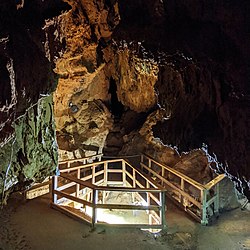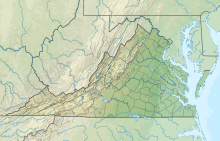| The Caverns at Natural Bridge | |
|---|---|
| Natural Bridge Caverns | |
 Formations at the Caverns at Natural Bridge Formations at the Caverns at Natural Bridge | |
   | |
| Location | 6477 S Lee Hwy, Natural Bridge, Virginia 24578 |
| Coordinates | 37°38′8.7288″N 79°32′29.9364″W / 37.635758000°N 79.541649000°W / 37.635758000; -79.541649000 |
| Depth | 347 ft (106 m) |
| Discovery | 1889 |
| Geology | |
| Access | yes; commercial |
| Show cave opened | yes |
| Features | Two unique species; various geological features: Colossal Dome Room, Mirror Lake, Well Room, Canyon Room |
| Website | www |
The Caverns at Natural Bridge are a series of commercial show caves in the Shenandoah Valley of Virginia, close in proximity to both the Natural Bridge and Natural Bridge State Park. Discovered in the 1890s, it was opened to the public in 1977.
The Caverns at Natural Bridge are the deepest commercial cavern on the east coast. The Caverns are home to two unique species — a beetle called the Natural Bridge Cave Beetle (Pseudanophthalmus pontis) and the Natural Bridge Isopod (Caecidotea bowmani).
Description
Guided tours and lantern tours are available. The Caverns are allegedly haunted. Tours usually last around 45 minutes.
The temperature remains a cool 54 °F (12 °C). The Caverns feature many unique structures including the Colossal Dome Room, Mirror Lake, Well Room, and the Canyon Room. The deepest part of the Cavern is 347 feet (106 meters) below the ground's surface.
The Caverns at Natural Bridge were previously called Buck Hill Caverns.
History
The Caverns were discovered by brothers Jake and Joe Fitzgerald. The owner of the property at the time was Colonel Henry Chester Parsons, who was also associated with the opening of The Natural Bridge.
Geology
The Shenandoah Valley is underlain with limestone and also has karst topography, forming caves throughout the region. Rainwater becomes slightly acidic as it seeps through the soil. The acid slowly erodes the calcium carbonate, the main component of limestone, creating caves, sinkholes and springs throughout the landscape. There are many caves and caverns throughout the surrounding area.
References
- "Caverns at Natural Bridge". Virginia Is for Lovers. Retrieved 18 April 2020.
- ^ "The Caverns at Natural Bridge". The Caverns at Natural Bridge. Retrieved 1 November 2023.
- ^ "The Caverns at Natural Bridge". Natural Bridge Historic Hotel & Conference Center. Retrieved 1 November 2023.
- "Explore the Natural Bridge Caverns | Caverns in Virgina". Natural Bridge. Retrieved 1 November 2023.
- Wilson, I.T. and T. Tuberville. 2003. Virginia's Precious Heritage: A Report on the Status of Virginia's Natural Communities, Plants, and Animals, and a Plan for Preserving Virginia's Natural Heritage Resources. Natural Heritage Technical Report 03-15. Virginia Department of Conservation and Recreation, Division of Natural Heritage, 217 Governor Street, 3rd Floor, Richmond, Virginia. 82 pages plus appendices.
- "Caves and Springs in Virginia". www.virginiaplaces.org. Retrieved 17 April 2020.
External links
| Caves of Virginia | |
|---|---|
| Commercial caves | |
| Other caves | |